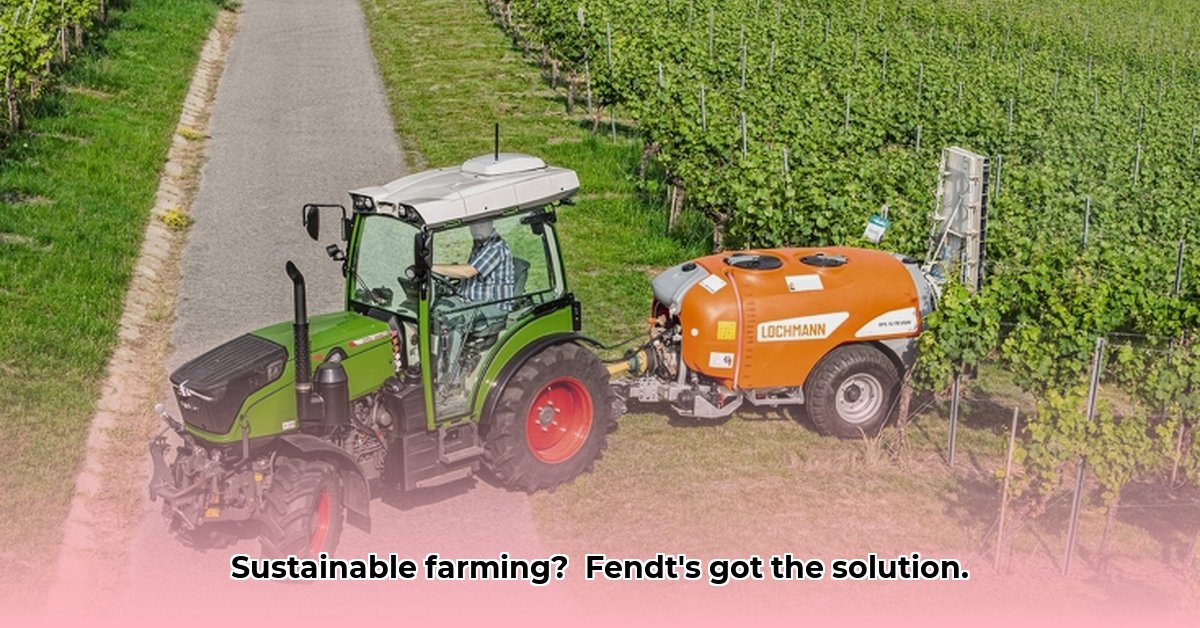
Grape growing demands precision and efficiency, especially in the face of environmental concerns and rising costs. Fendt vineyard tractors, with their advanced technology and focus on precision farming, are presented as a solution for sustainable viticulture. But do they deliver on their promise? This article explores the benefits and limitations of Fendt's approach, examining its impact on both environmental sustainability and economic viability for vineyard owners. For more details on Fendt tractors, visit this helpful resource.
Precision and Power Among the Vines
Imagine navigating steep slopes and narrow rows, carefully maneuvering around delicate grapevines. Fendt vineyard tractors, designed specifically for viticulture, offer a solution. Their low-profile designs and specialized tires minimize soil compaction (damage to soil structure) and vine damage, crucial for long-term vineyard health. This results in less soil erosion and a healthier ecosystem. But how much less damage? Further research is needed to quantify these benefits precisely across different vineyard types and soil conditions. Isn't it crucial to understand the exact extent of this benefit before widespread adoption?
Sipping Less Fuel, Producing More Grapes
Fuel efficiency is a key selling point. The Vario transmission system optimizes engine performance for reduced fuel consumption per acre, leading to lower greenhouse gas emissions and reduced operating costs. This translates to a lower carbon footprint and potential cost savings for vineyard owners. However, a detailed life cycle analysis (LCA) including manufacturing, materials, and disposal, is needed to fully assess the environmental impact. How does the fuel efficiency translate to a measurable reduction in greenhouse gas emissions per hectare?
A Kinder Touch on the Land
Beyond fuel efficiency, the minimized soil compaction from Fendt tractors promotes healthy soil structure, essential for healthy vine growth and higher yields. This contributes to a more sustainable practice, as it reduces the need for additional fertilizers and pesticides. But how significant is this impact on reducing the need for chemical inputs? Quantifiable data comparing yields and chemical use with and without Fendt tractors would strengthen this claim.
Adaptability to Diverse Landscapes
Fendt offers a range of tractors to suit different vineyard needs, from small, agile machines for tight spaces to larger models for steeper slopes. This adaptability is crucial for sustainable farming, ensuring efficient cultivation even in challenging conditions. However, this model diversity adds complexity to the decision-making process for choosing the right machine. Precise guidelines on model selection based on vineyard characteristics would be beneficial for potential buyers.
The Price of Progress: Cost Considerations
Fendt tractors are a substantial investment, potentially posing a barrier for smaller vineyards. The high initial cost must be weighed against long-term cost savings from fuel efficiency and increased productivity. Government subsidies, financing schemes, or cooperative ownership models may be necessary to improve accessibility. What are the realistic return-on-investment (ROI) scenarios for various vineyard sizes and operating conditions?
The Bigger Picture: A Life Cycle Assessment
True sustainability requires a comprehensive life cycle assessment (LCA) of the tractors, considering manufacturing, materials, and end-of-life management. Further research is needed to identify the long-term environmental impacts and evaluate areas for improvement, such as the use of recycled materials in manufacturing or more sustainable disposal methods. How can we minimize the environmental impact throughout the entire lifecycle of Fendt vineyard tractors?
The Future of Sustainable Viticulture
Sustainable viticulture needs a holistic approach. Research into alternative fuels, more sustainable manufacturing processes, and responsible end-of-life management are all key elements. Fendt tractors represent one component; broader industry collaboration is critical for progress. What role can technology like precision viticulture play alongside Fendt tractors to optimize sustainability further?
Areas for Further Research
More research is needed to:
- Develop detailed cost comparisons with other tractor models.
- Quantify the precise carbon footprint of Fendt tractors per cultivated hectare.
- Conduct comprehensive studies comparing their environmental impact across different vineyard types.
These data gaps hinder a complete understanding of the long-term sustainability of Fendt's approach.
Weighing the Pros and Cons: A Balanced Perspective
The Fendt vineyard tractor offers significant potential for sustainable viticulture. However, the substantial initial investment, data gaps in long-term environmental impact, and access limitations need careful consideration. Only through continued research, innovation, and collaboration can a truly sustainable future for the wine industry be achieved.